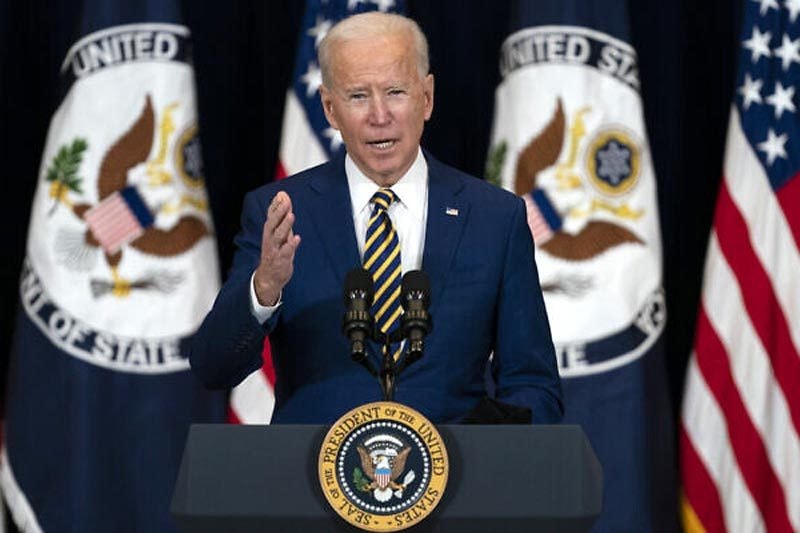Major changes in foreign policy of new US President Joe Biden
New President Joe Biden has declared that "America is back" and diplomacy will be restored to the center of the new administration's foreign policy.
American media reported,President BidenOn February 4, Mr. Biden made his first major foreign policy statement as the White House leader when he visited the State Department headquarters, met with new Secretary of State Antony Blinken and US diplomatic staff. Vice President Kamala Harris also accompanied Mr. Biden on this trip.
|
| US President Joe Biden. Photo: AP |
Rebuilding traditional alliances
In a 20-minute speech to foreign policy officials, Mr. Biden pledged to create a new era in American foreign policy, emphasizing the importance of traditional alliances and affirming that he would use diplomacy to engage with other countries.
Protecting freedom, promoting opportunity, upholding universal rights and respecting the rule of law are the "lightning cord of America's global power", giving the country an "eternal advantage" on the international stage, according to Mr. Biden.
“While many of these values have come under intense pressure in recent years, even pushed to the brink in the past few weeks, the American people will emerge from this stronger, more determined, and better equipped to unite the world in the fight to defend democracy, because we fought for it ourselves.”
The head of government warned that the US was facing a moment of “increasing global challenges”, from the pandemic to the climate crisis to nuclear proliferation. He believed all these problems would only be solved through cooperation between nations. “We cannot do it alone,” Mr. Biden said.
According to US Today, Biden's speech marked a major shift from the "America First" policy pursued by his predecessor Donald Trump's administration, which had created serious rifts in the relationship between Washington and some long-time allies.
Focus on diplomacy in foreign policy
During his campaign, Mr. Biden often spoke of the need to promote democracy around the world while rebuilding traditional alliances. In just two weeks since taking office, he has taken steps to reassert American leadership on the world stage by rejoining the Paris Climate Agreement and the World Health Organization.
The new US President also noted that over the past two weeks, he has spoken with leaders of many of America's closest allies, including Canada, Mexico, Britain, Germany and France, to begin restoring relationships that he said had weakened "after four years of neglect and abuse."
“America’s alliances are among our greatest assets, and leading with diplomacy means standing with our key allies and partners once again. But leading with diplomacy must also mean engaging with our adversaries and rivals diplomatically, for the benefit and to advance the security of the American people,” Biden explained.
Mr. Biden also sought to boost morale among public employees, whom former President Trump denounced and accused of conspiring to undermine his leadership.
For the officials and staff of the US State Department, Mr. Biden affirmed that he values their expertise and promised to always trust them while doing their duty. “America is back, diplomacy is back. You are at the center of everything I intend to do. You are the heart of that process," Mr. Biden said.
Policy towards China and Russia
About the problemChina, Mr. Biden spoke only generally. He said the United States would fight "China's economic abuses, aggression, and coercion to push back against Beijing's assault on intellectual property and global governance."
On relations with Russia, the new US President praised his administration's extension of the New START treaty with Russia, the only remaining nuclear arms control agreement between the two countries. However, he also criticized Russia for arresting opposition activist Alexey Navalny and demanded that Moscow release him "immediately and unconditionally".
Reversing many of the previous administration's foreign policies
President Biden has made the long-running civil war in Yemen a central focus of US foreign policy. He announced that he would end all US support for military operations in the Arabian Peninsula country, including arms sales. He revealed that he would appoint a special envoy to end the conflict, which has caused a "humanitarian disaster".
According to Mr. Biden, Defense Secretary Lloyd Austin will be in charge of a comprehensive review of the deployment of US forces around the world. While the review is underway, the US will stop transferring troops stationed in Germany elsewhere, as previously decided by the Trump administration. Mr. Trump once ordered the withdrawal of nearly 12,000 US troops from Germany to punish the European country for not fulfilling its NATO contribution obligations.
Mr. Biden also announced his intention to increase the number of refugees accepted by the US after the number fell to a record low during Mr. Trump's term. Specifically, in the first fiscal year of the new administration, starting October 1, the US will increase the number of refugees allowed into the country to 125,000 people, many times higher than the previous administration's quota of 15,000 people. Mr. Biden revealed that this move helps him fulfill a campaign pledge and he has directed the State Department to work with Congress on the issue.
Speaking to reporters after the new president's speech, White House press secretary Jen Psaki said Mr. Biden wants to focus on "restoring America's standing in the world." Security adviser Jake Sullivan added that everything the Biden administration is promoting related to foreign policy will be carefully studied to see if it helps bring "a better, safer, easier life for working families."

